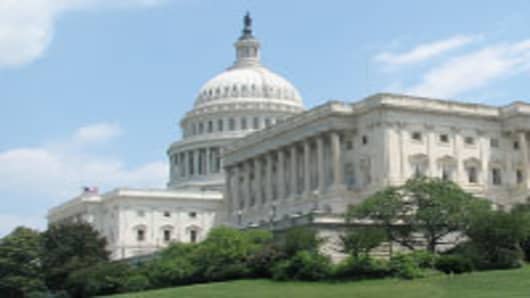On Wednesday, Obama's team announced details of his broader $75 billion housing plan, which features cash incentives for mortgage holders—known as loan servicers—who cut deals with borrowers for new, more affordable terms.
The bankruptcy measure has been the subject of an intense lobbying campaign by the financial services industry, which has worked hard to kill it.
It has exposed rifts among liberal Democrats who regard it as the only real way to help debt-strapped homeowners avoid foreclosures and moderates who want to give voluntary efforts a chance to work before resorting to the courts.
The same divisions are at work in the Senate, which is expected to consider its own version of the legislation in the coming weeks.
The industry already won several concessions from Democrats in the House, who agreed to limit the measure to existing loans, to homeowners who sought a loan modification from their lenders before filing for bankruptcy, and to people who can no longer afford to pay their mortgages.
Democrats were forced to put off action on the measure when moderates voiced concerns last week that the bill was still overly broad.
They wrote a compromise that requires bankruptcy judges to consider whether banks offered homeowners reasonable loan restructuring deals before they weigh in with their own rewrites.
Borrowers also would have a responsibility to prove that they tried to modify their mortgages with their lenders before seeking help in bankruptcy court.
The deal would require judges to consider whether homeowners were offered a "qualified" loan workout consistent with Obama's plan.
That program would let eligible homeowners rework their mortgages to bring their monthly payments down to no more than about one-third of their incomes.
The mortgage industry has argued that unfettered access to bankruptcy court mortgage modifications would impose steep and unpredictable costs on its companies that would be passed along to borrowers as higher fees and interest rates.
Although it calls the new compromise a good step, the industry is still opposed to the measure it brands the "cramdown." Lobbyists pressed lawmakers to limit the measure to subprime mortgages and to block homeowners who had been offered a mortgage workout by their lenders from getting one through a bankruptcy judge.
Slideshows from CNBC.com
Backers and a wide range of economists say that because the measure is limited to existing loans, banks would have no reason to raise future rates to factor in the cost of forced loan rewrites.
The measure is part of a broader housing package that would raise the Federal Deposit Insurance Corporation's borrowing authority and boost incentives for lenders to rework mortgages.
The legislation takes $2 billion out of the $700 billion Wall Street bailout fund to bolster an existing program to allow homeowners rework or refinance their mortgages.


